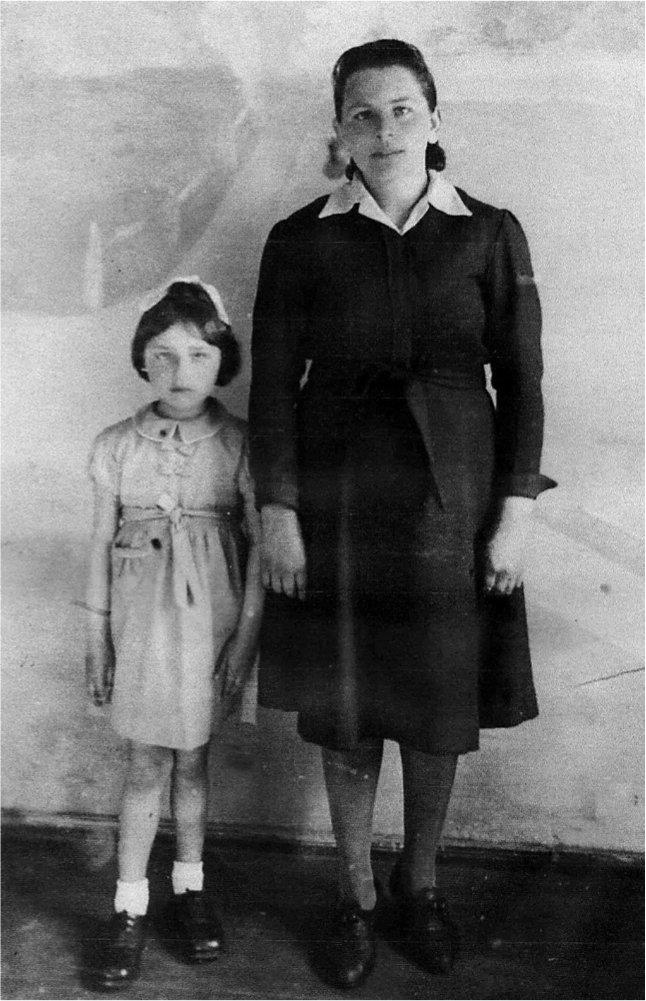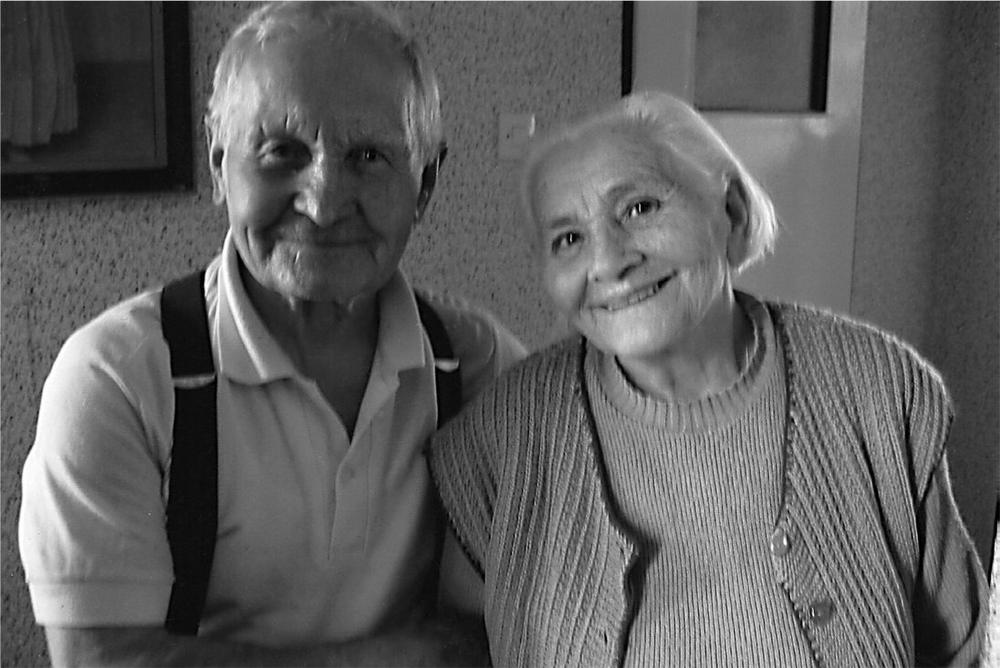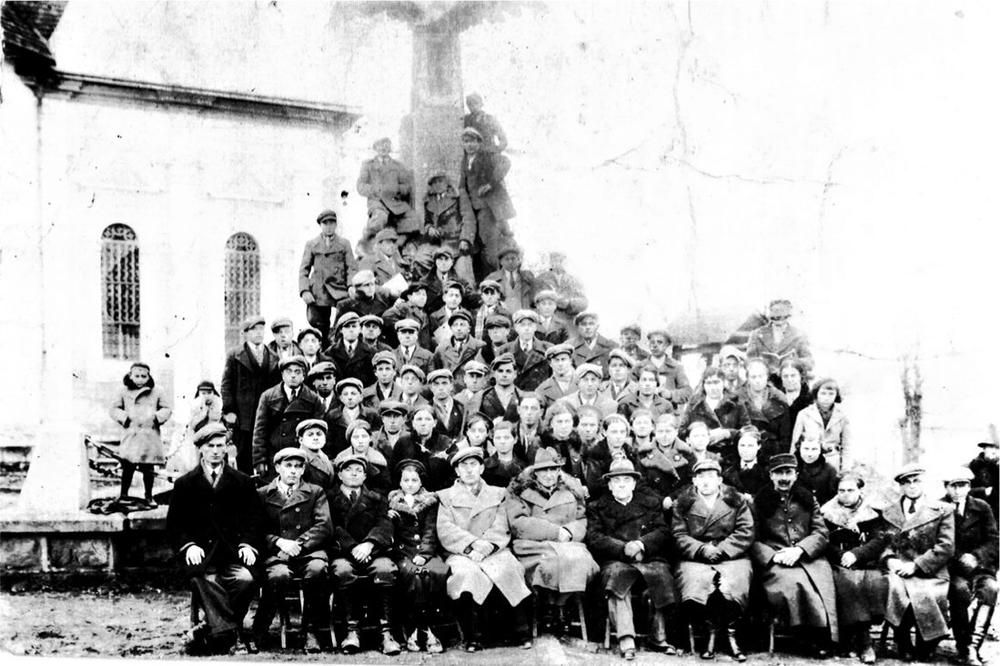Tailor of Inverness, The (23 page)
Read Tailor of Inverness, The Online
Authors: Matthew Zajac


Irena and Anna 1948 Irena wears the dress my father gave her
August 24
th
2005. Newcastle to Berlin. I’m going to Poland again, but not to Gdansk or Augustow, Krakow or Warsaw. I’ll stay the night in Berlin. Tomorrow I’ll drive 100 kilometres, just across the border, to Mieszkowice. I’m due to arrive at Irena’s house at lunchtime.
A thick invisible presence will accompany me, accompanies me now. He will hover at my shoulder as I leave the plane. He may need to talk to me in the dead of night. He will fill the space I’m not occupying in the little hire car. He will harry me and urge me on as I leave Berlin. He will grow restless at the border at Frankfurt-Oder, where we crossed on childhood holidays, turning south towards Uncle Adam’s, never north to drive the 40 kilometres to Mieszkowice.
He will grow fearful, grief-stricken and numb as I approach Mieszkowice, ask for directions and find Irena’s house. He will follow me, perhaps at a distance as I approach it.
He will be afraid when Irena appears. He will place himself between us as we meet each other’s eyes, as we hold each other’s hands and, as we embrace, he will engulf us.
I drove into the square at the centre of the little town of Mieszkowice and parked the car. It was cool, clear and sunny. Climbing out, I scanned the people going about their business, looking for Piotr, Irena’s grandson, who I had exchanged text messages with as I approached the town. There was a young man across the road, slightly swarthy, with close-cropped hair, looking out. He spotted me and the German number plates on the hire car. I waved tentatively. It was him. We crossed towards each other and shook hands. His English was halting. He got into the car with me and he led us through an archway into a yard behind the shops on the square. I parked and got out. Three women, a man, a teenage girl and a boy were standing on a stone stairway which led up to apartments. The oldest woman was at the top of the stairs. We didn’t say much as we approached each other. Perhaps we didn’t say anything.
We just fixed our eyes on each other and pulled ourselves towards each other. And he was there somehow, as we embraced and held each other, and cried.
‘Moj brodzy. Moj brodzy.’ My brother. My brother.
I ate and drank with them. Irena admonished her husband Czeslaw for the frequency with which he refilled the vodka glasses. I joked with Mirka and her sister Beata and her children Piotr, Sabina and Wojtek. We gazed with wonder at each other. Irena smiling with her dark eyes. My translator Piotr sat by my side. He stayed with me like this for virtually every waking hour I was in Mieszkowice.
Irena told me that she had met Uncle Adam by chance at a party in Zielona Gora when she was 18 years old, in 1959, the year I was born. They were in a room full of people. One of Irena’s friends pointed across the room and said ‘You see that man? That’s your uncle.’ She approached him and
introduced
herself. She asked him to tell her father about her. She gave him her address, asking that he pass it on to Dad and urge him to write to her. He said he would, but she never heard a thing from either of them. Maybe Adam never passed on her message. Maybe our father chose to ignore it.
I was taken to Anna’s house. Jan opened the door to us, a small, compact and strong old boy, clear-eyed and with a benign smile. It was a small, simple apartment on the ground floor. He ushered us into the little, windowless hallway where shadowy light spilled in from the neighbouring rooms, and there she was, a small white-haired old woman, slightly bent from all her years of work, with arresting blue eyes and the face of an angelic pixie. Like an aged, girlish, Slavic Audrey Hepburn.
She took me in with those wide blue eyes as she held my hands, starting to talk softly to me and I felt as though she was transporting me back in time. Slowly, it became apparent that, for her, it was as if he had walked through her door after
an absence of 64 years. She didn’t see me, she saw him. She treated me like I was him, for the two hours of my first meeting with her, and for my subsequent meetings with her during my four days in Mieszkowice. I think she saw me from time to time, but most of the time she gave free rein to the heady dream which my presence engendered for her. The dream which she had over and over again during those terrible years, that he had come back. And now I was here, she asked me why
I
had never come back, it was so good to see me again. She stroked my face, asking me if I would take her with me. She stroked my leg with her strong, gentle hands. Working hands, worn hands, translucent skin. She whispered sweet nothings across the room, she winked at me, she held my hand in hers. It was as if she was twenty again, as if we were courting, as if I had just come across the stream from the house in Gnilowody to her house, or as if we had returned together from a walk in the fields. Those warm summer days of bucolic pleasure when they loved together. When Irena was conceived. Mateusz and Anna. Anna Laska.

Jan and Anna Kotek, nee Laska 2005
I stayed with Beata, Irena’s youngest daughter, a late child, only 26, and her husband Marcin. His father, like most of Mieszkowice’s older generation, was also from Galicia. There were others in the town from Gnilowody. I met Praxheda, another tiny old woman, wiry, dark-haired, 93 and garrulous. She attended the wedding of Anna and Mateusz. A short wedding, because of the straitened circumstances of the Soviet occupation, only two days. The dancing was in a big barn and in the yard in front of it. They played all the dances, Oberek, Mazur, Polka, Sznej Polka, Kozak… With a fearful look in her eyes and a wailing voice, Praxedha told me of the executions she had witnessed in Gnilowody in 1944, Polish men who had been laid face down on the ground by the
banderovci
, their hands tied behind their backs, their heads pulled up by the hair, their throats cut. That method saved bullets.
I dined with Mirka and her family and met her brother Marek and his family, my niece and nephew, though only a few years younger than me. Mirka took me to a print shop in a neighbouring town to copy some old photographs belonging to Anna and Irena. She presented them to me in an album: Irena’s wedding in 1961; her confirmation photo when she was 12; with teenage friends at a funfair; Mirka, Marek and Beata as children in the 1960s; Anna on the street in Mieszkowice around 1950, fresh-faced and recovered from the war.
There were also two photos of my father, both from Podhajce in 1938. In one, he sits in the centre of a small group, fellow apprentices at the tailoring school, three young women in coats with fur collars and fashionable little round hats and a melancholy young man, dark hair neatly parted. My father wears a pin-striped, double-breasted jacket with wide, wing lapels, a shirt and a tie. He fixes the camera with a serious look. The second photograph is of a much larger group, the whole tailoring school I think, 70-80 people, the majority men,
in front of Podhajce’s Polish Catholic church, using what appears to be the steps and lower structure of a war memorial to create a pyramid shape for the group. A grandee sits at the centre of the front row, wearing a voluminous fur-collared coat and a Homburg. There are a few other senior-looking folk on either side of him and a couple of the young women in the first picture, and at one end sits my father, clearly taller than everyone else, in a smart dark short coat, scarf, shirt and tie, baggy trousers with turn-ups and a flat cap. Nearly all the men wear flat caps. He looks very serious and handsome, with his high cheekbones and slightly slanted, Slavic eyes. His big hands rest on his knees. His shoes are shiny. He was always pretty smart.
I wonder how many of this group survived the onslaught which was about to engulf them. How many of them ended up in the Podhajce ghetto? Around 70% of the town’s
population
was Jewish, and in those days, 90% of Galicia’s tailors were Jewish, so it’s likely that most of this group perished. Which of them ended up dying on a battlefield, labouring on the permafrost, hiding in a cellar, starving in a camp,
collaborating
to save his skin, protecting a neighbour, spitting at a victim, looting a corpse, being raped, joining the partisans, surviving? I know the fate of only one.
Stefania arrived from Szczecin, a bundle of energy and
enthusiasm
, delighted to have been the one who had brought us together. We all dined together in the open air at the family allotment, a couple of acres of orchards, vegetable gardens and beehives, tended by Jan. He proudly showed me his vats of delicious honey, collected at different times of the season, from different flowers. We drank Jan’s excellent
bimber
. I was welcomed with open arms into this family and though I was the special guest, I quickly became familiar to them as we laughed and celebrated. Irena and her family accepted me without question, looked after me, pulled my leg, the long-lost brother from Scotland.

Tailoring school group, Podhajce 1938. My father is on the front row, far left
We visited a museum and war cemetery by the Oder, a few kilometres from Mieszkowice, a bridgehead for the Soviet Army as they advanced towards Berlin. We swam in the nearby Lake Moryn. We visited Stefania in Szczecin and had a tour of a fire station, where Mirka’s husband Marek, a witty French speaker, was assistant chief. Irena and I did ordinary things together. Visited the shops, went for a walk, ate together. But because of who we were and how we had come to meet and the aching gulf of time and experience which was behind us, to simply sit at a table together was a moment to treasure. Many questions remained unanswered, but somehow they had ceased to matter.
When the time of my departure came, the women were full of tears. So was I. With the faithful Piotr by my side, Beata and Mirka took me to Anna. I was still a ghost to her. I hugged her to my chest as I said goodbye and as she withdrew from me, she let out a primal cry, a searing wail of loss from the pit of her stomach, from the core of her being, from decades
ago. He was leaving her again. It sent her crashing to the floor. When I left, she lost consciousness for two days.
Irena held on to me, and I to her. She said that now I was a part of her, that my family was her family. She urged me to return. I promised I would. They watched in silence as I got into the car, and waved as I pulled away. I guided the car out of Mieszkowice and drove on a straight road through fields. After a few kilometres, I had to stop, to cry until I was exhausted by crying. Through a lifetime of separation and ignorance, through the juddering echoes of that great war and the fragile threads which survived the destruction of people, families and places, and through this son’s search for his father, some reparation had been made. I didn’t really know what I had been looking for, but now, at last, I knew I had found it.

Me and Irena, Loch Ness 2006
